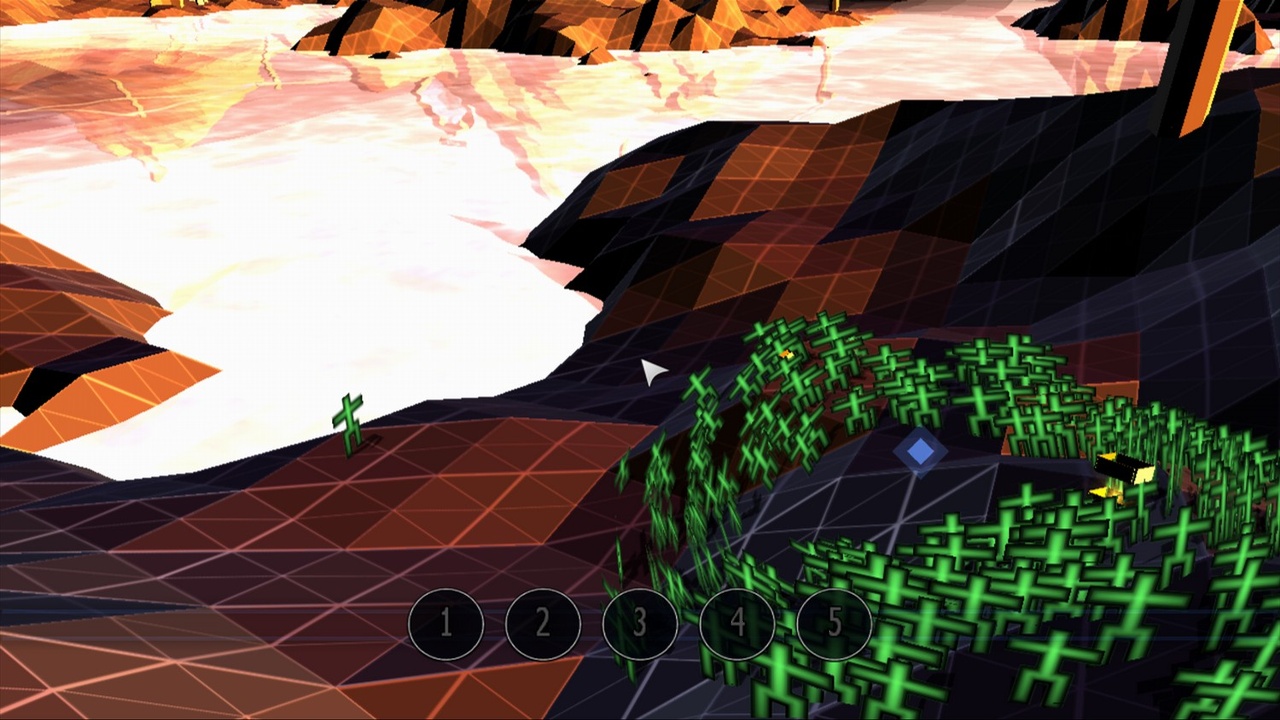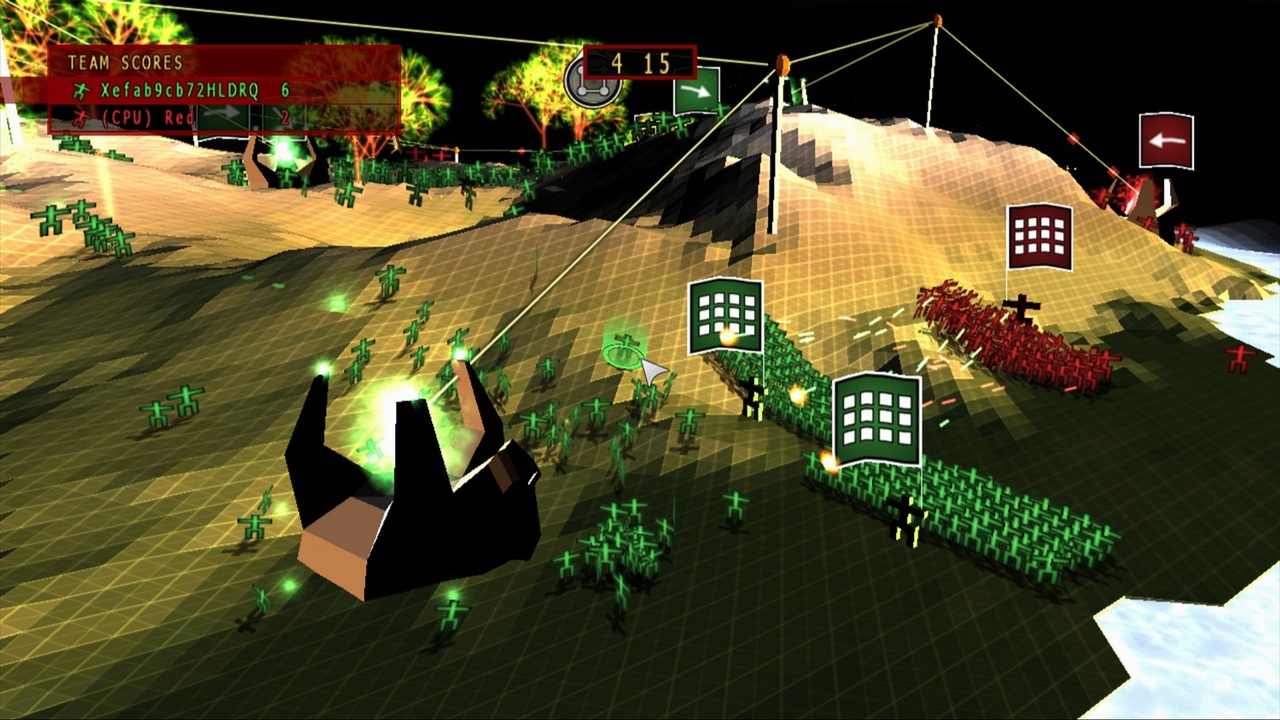Five years haven't hurt Darwinia. Introversion Software's 2005 PC mash-up of real-time strategy, puzzles, and god gaming may just be arriving on the Xbox 360 courtesy of the Xbox Live Marketplace, but the unique game sure hasn't lost any of its catchy charisma. Darwinia+ is actually something of a greatest hits compilation and bundles together the original cult hit along with its multiplayer, Multiwinia: Survival of the Flattest, sequel from 2008 for a very reasonable 1,200 points. Both are amazingly addictive once you get past the initial "Huh?" factor that accompanies such inimitable concoctions. A lack of new features might be a bit of a concern for those who already surrendered huge chunks of their lives to these games in years past, but anyone yet to experience the weird majesty of this cross-genre experiment simply has to check this out.

Much of Darwinia+ defies easy description. The meat of basic single-player Darwinia has been borrowed from god games like Populous and has you playing as an assistant to Dr. Sepulveda. This bespectacled scientist has created a computerized neon world straight out of the '80s (think Tron) populated by green stick figures called Darwinians. Generations of these little guys lived in peace for ages until a computer virus got loose and began killing them off. This is where you step in, as a deity-like figure with the power to create units, program various small buildings to do your bidding, and guide the Darwinians to safety. You control squads of soldiers in battle against the worm-, spider-, and centipede-like virus enemies. You also guide mechanic units to reprogram buildings and collect digitized souls of defeated foes for conversion into Darwinians, as well as navigate puzzle landscapes dotted with obstacles. Darwinians look and act a fair bit like the dotty green-haired goons from the Lemmings series, in that you can't control them directly when trying to lead them to safe zones. All you can do is promote officers from the ranks to point them in the right direction and then pray that these suicidal-yet-lovable halfwits manage to get where they need to go. So if you ever wanted to throw Age of Empires, Lemmings, and Populous into a blender, now is your chance.
Yet despite the confusing array of influences, Darwinia is simple to play. That is, at least once you get past the weirdness of the setting that makes it hard to understand objectives in the beginning (a tutorial has been added here, but it sticks strictly to obvious gameplay mechanics and is pretty much useless). All of the levels break down to you fighting virus enemies, collecting souls, sending Darwinians out to power up then control various machinery, and using the entire environment in concert to get your green goofballs out of harm's way. Every map is one big, intricate puzzle of floating islands to be solved, and all the levels in the campaign form a coherent whole that sort of resembles an electronic ant farm. You're constantly hit up with challenges that tax different centers of your brain, so it's impossible to get bored. One moment you need to clear out a huge swarm of worm viruses with a combat squad, being careful not to miss a single one or you'll find yourself doing the whole thing all over again (because these creatures reproduce like bunnies). The next, you need to shepherd Darwinians across huge stretches of land to a safe zone, pushing them along every step of the way with your crossing-guard-like officers. Then, you need to harvest souls with mechanic units and reprogram buildings to birth more Darwinians.
It's very addictive and rather Zen; the gameplay, surreal vectorlike graphics, sparse/haunting ambient music, and jarring sounds (shooting centipedes sounds a lot like smashing metal garbage can lids together) create a hypnotic effect. Rudimentary controls let you interact with the game and rarely even consider the gamepad in your hands. You stick to the standard Xbox formula of using the A button to select, the B button to go back, and the X button to move or interact with the environment. The only noteworthy change from the PC interface is the handling of combat units. Taking charge of a squad now turns the game into something of a twin-stick shooter, with you moving with the left stick and firing with the right. This change adds a refreshing splash of action to a game that is otherwise slow and cerebral. There are just a couple of bumps in the road. Clunky Darwinian pathfinding should have been cleaned up for this rerelease--especially the little guys not being able to travel when they can't see the destination. You can get bogged down here with handholding, and the pace is a touch sluggish on the larger maps where goals can take more than an hour to accomplish. Too often you're stuck waiting ages for units to move into place or be beamed from one island to another via teleporting coastal radar dishes. The hands-on combat is also a touch wonky in spots, as your targeting reticle skids over hilly terrain and causes you to launch some salvoes into the ground.

Multiwinia has made a similarly easy transition from the PC to Xbox. This multiplayer sequel drops the puzzles of the original game's campaign for more traditional RTS action, with you guiding Darwinian descendants called Multiwinians into war. Gameplay is fairly simplistic. Multiwinian troops are created automatically at spawn points and then band selected to be hurled at enemies en masse. Game modes include standard multiplayer options like Domination and the Capture the Flag-like Blitzkrieg, along with more offbeat touches, such as Capture the Statue, where you win by collecting statues that appear in various spots on the map. All modes can all be played online against human opponents or solo against the computer. Battles run largely on automatic, with no micromanagement. Aside from a few fine points to look after, like promoting Multiwinians to officers and using them to guide troops or lead formations into combat, matches are all about your stick-figure troops automatically attacking with lasers or grenades as soon as they close in on adversaries. The side with the largest numbers typically prevails.
Matches are fast. They take place in close quarters, so battles begin as soon as the clock starts ticking. Strategy takes a back seat to quick and efficient troop maneuvers with enemies right on your doorstep. If you don't get off to a good start, you lose. Chaos is further ramped up with the random appearance of crates stuffed with power-ups. You never know what these goodies will do to games. Sometimes they bring boons, like nukes, flamethrowers, and population explosions, but they can also call down curses like changing your troops into a mixture of foes that start a civil war at one of your spawn points. Most of the time, this speed is great. Matches fly by but are also loaded with tense moments where you watch huge gangs of Multiwinians facing off in titanic engagements and going to grab a crate without knowing what it will do to the field of battle. Yet what was easily handled with a mouse and keyboard in the PC version of the game has been made more difficult to wrangle with a gamepad. Scrolling the cursor around with the left stick is a bit sluggish, and even doing common tasks like band selecting troops is somewhat awkward. At least you get better with practice, as you unlearn the PC controls.
Even arriving five years late for the party, Darwinia+ remains the sort of game that grows from an idle curiosity into a full-blown obsession before your eyes. It's cute, offbeat, and crazy addictive--at least after you get accustomed to the sheer strangeness of everything.